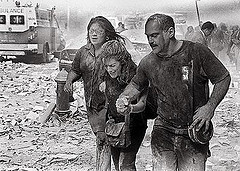God may already be restraining 99.99 percent of evil and suffering.

Why does the chaos that breaks out in some corner of the world always prove the exception rather than the rule? Why haven’t tyrants, with access to powerful weapons, destroyed this planet? What has kept infectious diseases and natural disasters from killing 99 percent of the world’s population rather than less than 1 percent?
In the collapse of New York’s Twin Towers, fifteen thousand people came out alive. While this doesn’t remove the pain felt by families of the nearly three thousand who died, it shows that even on that terrible day, suffering was limited.
 Nanci said to me, “Given what Scripture tells us about the evil of the human heart, you’d think that there would be thousands of Jack the Rippers in every city.” Her statement stopped me in my tracks. Might God be limiting sin all around us, all the time? Second Thessalonians 2:7 declares that God is in fact restraining lawlessness in this world. For this we should thank him daily.
Nanci said to me, “Given what Scripture tells us about the evil of the human heart, you’d think that there would be thousands of Jack the Rippers in every city.” Her statement stopped me in my tracks. Might God be limiting sin all around us, all the time? Second Thessalonians 2:7 declares that God is in fact restraining lawlessness in this world. For this we should thank him daily.
If God permitted people to follow their every evil inclination all the time, life on this planet would screech to a halt. Sometimes God permits evil by giving people over to their sins (see Romans 1:24–32), and this itself leads to the deterioration and ultimate death of an evil culture, which is a mercy to surrounding cultures. The most morally corrupt ancient cultures no longer exist.
“But many children suffer; why doesn’t God protect them?” We don’t know the answer, but we also don’t know how often God does protect children. The concept of guardian angels seems to be suggested by various passages (see, for example, Matthew 18:10).
God gives us a brief, dramatic look into the unseen world in which righteous angels battle evil ones, intervening on behalf of God’s people (see Daniel 10:12–13, 20). How many angels has God sent to preserve the lives of children and shield them from harm?
My earliest memory is of falling into deep water and nearly drowning; someone my family didn’t know rescued me. As a parent and a grandparent I have seen many “close calls” where it appears a child should have died or suffered a terrible injury, but somehow escaped both.
This thought, of course, doesn’t keep a parent’s heart from breaking when her child suffers or dies. Still, though I can’t prove it, I’m convinced God prevents far more evil than he allows.
God may also be preventing 99.99 percent of tragedies.
Great though they may be, God actively restrains the tests and temptations that come our way so that we will not experience anything greater than we can bear (see 1 Corinthians 10:13).
 Fatal car and airplane accidents bring awful devastation, but statistically these are rare. On January 15, 2009, what should have brought certain death to passengers aboard Flight 1549, and catastrophe to Manhattan, turned into what secular reporters labeled a “miracle.” The pilot, Chesley Sullenberger, safely landed a crippled plane in New York’s Hudson River, with no serious injuries.
Fatal car and airplane accidents bring awful devastation, but statistically these are rare. On January 15, 2009, what should have brought certain death to passengers aboard Flight 1549, and catastrophe to Manhattan, turned into what secular reporters labeled a “miracle.” The pilot, Chesley Sullenberger, safely landed a crippled plane in New York’s Hudson River, with no serious injuries.
While chunks of ice and busy ferries filled most of the river, the place where the plane came down remained clear of both ice and boats. It landed without breaking apart. Ferryboat captains rescued all 155 people from the frigid river within minutes. The New York Times suggested “more than luck” brought the plane down mere minutes from experts trained in water rescues. Passengers who said they hadn’t believed in God nevertheless prayed to him on the plane, then publicly thanked him for sparing their lives. [1]
I tell this story to raise a question—isn’t it likely that a kind and all-powerful God routinely prevents terrible tragedies in ways that we do not see and therefore do not credit as miracles?
While the miracle of Flight 1549 appears to be the exception, not the rule, we cannot know about most of the equally miraculous interventions of God that may have invisibly prevented other catastrophes. Perhaps one day we’ll hear those stories and marvel at how often God intervened when we imagined him uninvolved in our world.
God exercises wisdom and purpose by not always intervening in miraculous ways.
 As a young Christian, a teenager, I often asked God to show me signs. In the darkness of my room at night I would light a match and ask him to blow it out. What a simple miracle I requested! Nothing on the level of raising the dead, not even turning water to wine. But he never granted my request. And though I didn’t understand why at the time, now I have a better idea. What would I have asked him to do once he blew out the match? Levitate the pool table? And then what would I ask him to do to top that? Where would it end?
As a young Christian, a teenager, I often asked God to show me signs. In the darkness of my room at night I would light a match and ask him to blow it out. What a simple miracle I requested! Nothing on the level of raising the dead, not even turning water to wine. But he never granted my request. And though I didn’t understand why at the time, now I have a better idea. What would I have asked him to do once he blew out the match? Levitate the pool table? And then what would I ask him to do to top that? Where would it end?
How many magician’s tricks would we call upon Jesus to do? As we share Christ with a neighbor who says, “I don’t believe in God,” we might say, “Oh yeah? Watch this.” Then we’d call on God to torch the man’s maple tree. Seeing the tree vaporize would get his attention! And surely it would generate faith-oriented conversion, right?
No. That’s not how faith works, and it’s not how God works.
God did bring down fire from Heaven on occasions (see Numbers 16:35; 1 Kings 18:38). He even opened the earth to swallow up his enemies (see Numbers 16:31–33). Did this result in people turning to him for the long run? No. Jesus fed the multitudes and many followed for a while, but they turned away recoiling from his demanding words (see John 6:1–66). Abraham told the rich man that his brothers “will not be convinced even if someone rises from the dead” (see Luke 16:27–31).
We say, “Show me a miracle and I’ll believe,” yet countless people who have seen miracles continue to disbelieve.
In our eagerness to see greater miracles, we regard “natural processes” as minor and secondary, missing God’s marvelous daily interventions on our behalf.
Focusing on God’s “big miracles”—like curing cancer and making brain tumors disappear—causes us to overlook his small, daily miracles of providence in which he holds the universe together, provides us with air to breathe and lungs to breathe it, and food to eat and stomachs to digest it.
Years ago when I became an insulin-dependent diabetic, it dawned on me that I had never once, in the fifteen years I’d known him, thanked God for a pancreas that had worked perfectly until then.
No matter how much God reduced world suffering, we’d still think he did too little.
Evil and suffering make up part of a world in which God allows fallen people to go on living. How much evil and suffering is too much? Could God reduce the amount without restricting meaningful human choice, or decreasing the urgency of the message that the world’s gone desperately wrong and we need to turn to the Redeemer before we die?
Suppose we rated all pain on a scale of one to ten, with ten representing the worst and most intense pain, and one describing the unpleasant yet quite tolerable. Say “engulfed in flames” got a ten rating while “mild sunburn” received a one. If God eliminated level ten pain, then level nine pain would become the worst. God could reduce the worst suffering to level three, but then level three, now the worst, would seem unbearable. Any argument that judges God’s goodness strictly by his elimination of pain will, in the end, not leave us satisfied if he permits any pain at all.
In Part 2, we’ll look at whether we would really want God to punish evil immediately, and at how God allows substantial evil and suffering because he values our sense of neediness and trust as we turn to him for his grace.
This is an excerpt from If God Is Good, by Randy Alcorn.
Source
[1] Michael Wilson, “Flight 1549 Pilot Tells of Terror and Intense Focus,” New York Times, February 9, 2009.
Photo Credits: 9/11: wstera2 via photopin cc | | city: casch | flight 1549: derek7272 via photopin cc | lit match: Micah Taylor via photopin cc | sunset: macisaguy via photopin cc





